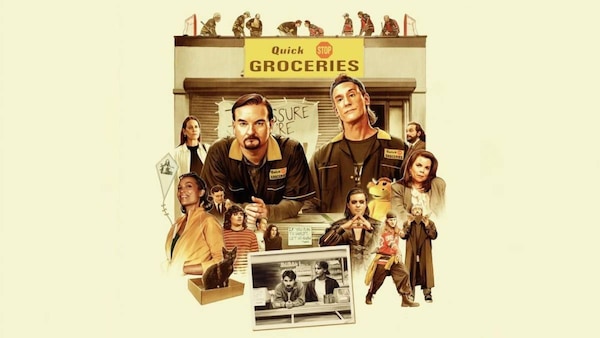With Clerks III, Kevin Smith Goes Back To Where It All Began
A cult franchise returns. So does the elusive quality that makes it such an outlier in the world of Hollywood.

Last Updated: 01.59 PM, Jan 06, 2023
Midway through Clerks III, Silent Bob (played by director Kevin Smith himself) speaks for the first time. “The colours in this convenience store are ghastly. Any filmmaker worth their salt would know that the only way to deal with that is to neutralise the colour. It also serves as a commentary on the soulless nature of commerce,” he says, in a nonchalant response to Randal’s doubts about Bob’s ability with the camera.
This is obviously a ruse to answer a popular question about the franchise itself — the first Clerks was shot in black and white back in 1994. Smith is a curious filmmaker, cocky enough to import his knowledge of pop culture into his scripts, and vain enough to both claim and deny a kind of special cinematic status, love over reverence. That said, he has helped launch careers, written some of the most darkly comic material for screen and remains a quixotic man-child who continues to dress like a teenager. With Clerks III, he bids farewell to the unlikeliest of legacies, created for the most part on the shoulders of the one thing that eludes many filmmakers — a fandom.
Randal (Jeff Anderson) and Dante (Brian O’Halloran) return to the site of the original, back at the convenience store where it all began. Dante has lost his fiancée (played by Rosario Dawson in Clerks II) while Randal seems unchanged, except for a sagging chin and balding pate. Both look older, dishevelled, even a little worn. Both deal with it in different ways too. Dante is — as usual — the sensible one, forlornly cussing at things he cannot seem to control. Randal remains brutally exuberant, hiding perhaps a hint of fragility that this third film attempts to crack open. It makes sense, to finally get a closer look at the franchise’s loudest yet most obscure character.
The plotline is fairly simple, and in the most ‘Smith’ of ways, quite meta. Randal is recovering from a heart-attack, and takes the bait when Dante comments: “You could have made a good movie”. The movie, obviously, would be about two plucky, underdog retailers working out of an unremarkable convenience store in the middle of nowhere. Everyone will play themselves, and for direction and assistance, Randal and Dante enlist their old buddies Jay (Jason Mewes) and Silent Bob (Smith) — characters who will go down in some sort of cinema lore for sure. Jay and Silent Bob seem not to have aged at all, compared to the two protagonists. Shooting ensues, egos clash, and as is the template of the franchise, culminates in a reckoning of sorts. Except, this time, the garrulous machismo of the men gives way to a more sobering reality.
Smith, who survived a heart-attack himself, tries to meditate on the uncertainty of life, of not knowing when that indelicate end might come, or how. The usual traits are present: pop culture conversations, feisty debates about religiosity, quirky characters, and an acidic examination of unequal friendships. But the old Randal and Dante must also, for the first time, confront a real sense of jeopardy. They are possibly each other’s opposites in every way but for the things they “like to do together”: watch films, play sport or quibble about the facts, and speculate on the possibilities of pop culture. Unlike most cinematic friendships, they are probably the most ill-fitting pair of underachievers who retain faith, maybe not in being together, but in their inability to find someone else. Someone who gets them.
Clerks III isn’t as novel as the original, or as primal and mature as the sequel. It also suffers, strangely, from accumulating tools over and above the bare necessities. Smith has partly been unique for his ability to utilise scarce resources, to create maximalist, provocative cinema with minimal means. Even in terms of acting, he hasn’t ever really gone to the ‘professionals’ (though some, including friend Ben Affleck, make appearances here) which lends his films a sort of irreversible rawness that despite three decades of gestation and growth, continue to — charmingly — feel consistently and fascinatingly undercooked. The filmmaking is endearingly just as rugged and robust as it was when Smith made Clerks. This has probably helped Smith retain his unique voice.
The Clerks franchise is really an anomaly. A timeless analysis of friendship spanning three decades or more, with a film almost every decade, seemingly cut from the same uncouth, but seminal cloth... Everything about the long incubation period, the elusiveness, reeks of high-brow tools associated with auteurs and yet Smith has returned, with his low-brow lens cutting films with the same sluggish methods that made him distinctive in the first place. Nothing — neither the acting nor the direction — has changed all these years, amounting to a capsule of storytelling that has refused to cower to modernism and its frantic necessities, to become historic still.
Clerks III is streaming on Lionsgate Play
